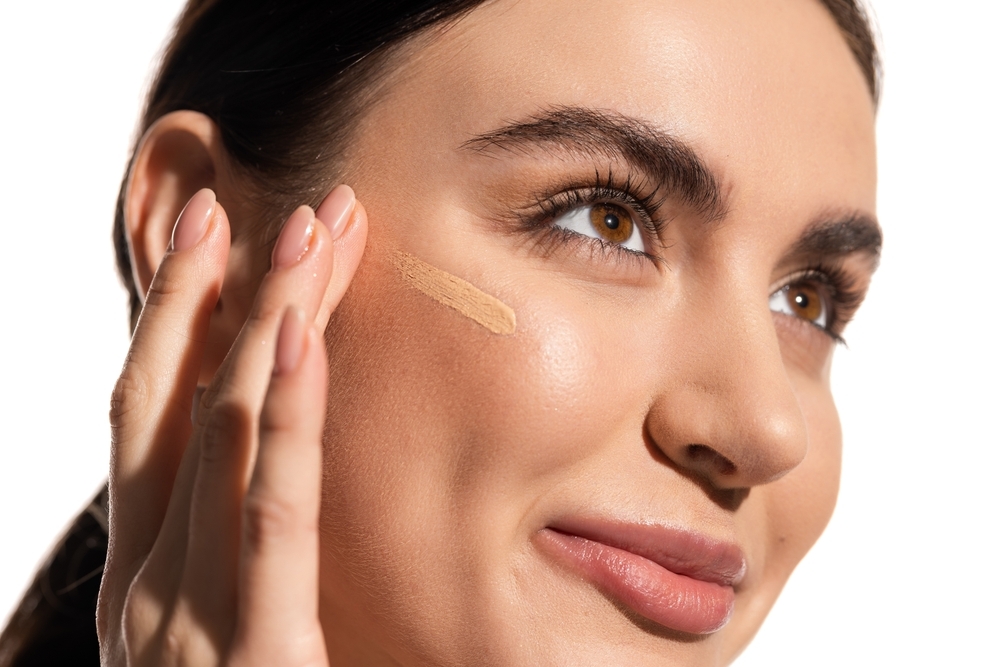Many consumers look for multitasking beauty products, and tinted sunscreens check more than one box. But what is tinted sunscreen, exactly? Apart from providing sun protection, this product comes with other benefits you might not be aware of.
Read on as cosmetic chemist Ginger King and Dermatologist Dr. Rachel Westbay break down the benefits of tinted sunscreens and offer their insights about why you might want to incorporate one into your routine.
What Is Tinted Sunscreen?
Aptly named, tinted sunscreen is a sunscreen that comes in different shades (or tints) to better match your natural skin tone. "Tinted sunscreens are wonderful because they contain mineral [ultraviolet] filters like Zinc Oxide and Titanium Dioxide . . . combined with added pigments," says Dr. Westbay.
King agrees, noting that products like EltaMD UV Clear Tinted Broad-Spectrum SPF 46 contain encapsulated pigments called Iron Oxides. These tinting agents break upon contact with the skin to blend in seamlessly and avoid that chalky white residue that some regular mineral sunscreens are infamous for.
Dr. Westbay explains that these pigments have two primary functions: to combat that chalky appearance, or white cast, and to deflect visible light in ways that regular sunscreens can't.
Tinted Sunscreen vs. Beauty Products with SPF
While it can be easy to compare tinted sunscreens with foundations or tinted moisturizers that contain SPF, they're distinct products. King explains that a foundation with SPF might not provide adequate sun protection, while a tinted moisturizer with SPF's primary function is to hydrate the skin.
According to Dr. Westbay, if you're looking for the best protection against the sun's harmful ultraviolet (UV) rays, always trust a sunscreen before a foundation or moisturizer. "The best way to think about it is that, as the name implies, tinted sunscreens are first and foremost sunscreens," she says. "They are, therefore, much more reliable in their ability to provide sufficient broad-spectrum UV coverage when used on a daily basis. Most moisturizers and foundations with SPF are exactly as their name implies: they tend to be, first and foremost, either a foundation or moisturizer, [and] the SPF is a bit of an afterthought."
Which Is Better: Tinted or Untinted Sunscreen?
So, which is better: tinted or untinted sunscreen? Both King and Dr. Westbay say that tinted sunscreens are just as effective as other types of sunscreen, but tinted formulas come with added benefits.
Benefits of Iron Oxide Formulas
Dr. Westbay recommends tinted sunscreens to patients who want light coverage to even out their skin tone while still getting the full amount of SPF. Here are some other advantages of tinted formulas:
Protection against Blue Light
More studies are showing that blue light from phones and computer screens can cause skin aging. According to Dr. Westbay, emerging data shows that Iron Oxide is the most effective ingredient for protecting against blue light. Because the majority of non-tinted sunscreens don't include Iron Oxide, she recommends opting for the tinted version to bulk up your defenses against visible signs of premature aging.
Natural-Looking Coverage
One of the best things about tinted sunscreens is that they won't leave behind that dreaded white cast. King names Titanium Dioxide and Zinc Oxide as the culprits for this "ghosting effect" in non-tinted formulas, which can be especially bothersome for people with darker skin tones. If this is a concern for you, tinted sunscreen might be the answer to a smoother, more natural-looking blend.
Compatibility with Beneficial Skin Care Ingredients
Finally, you can often find tinted sunscreen formulas paired with other beneficial skin care ingredients. Iron Oxide works well with all kinds of formulas, so look for a tinted formula that can repair, strengthen, and rejuvenate your skin. For example, EltaMD UV Restore Tinted Broad-Spectrum SPF 40 includes Ginger Root and antioxidants to improve skin tone and texture and protect against skin-aging free radicals.
Can You Use Tinted Sunscreen as a Foundation?
If you're debating between tinted sunscreen vs. foundation, consider your end goal. King and Dr. Westbay agree that tinted sunscreens can take the place of a light foundation. This can also simplify your routine since you'll get adequate UV protection and lightweight coverage in one step. "Most decent tinted sunscreens give the kind of coverage worthy of a light foundation, so they can definitely be worn alone or in place of foundation without any other complexion-correcting makeup," says Dr. Westbay.
However, because tinted sunscreens often come in limited shades, they might not be a perfect match for your skin tone. If you're looking for full coverage, you're better off applying sunscreen and foundation separately rather than opting to combine them into one product.
Elevating Your Daily Routine
"There aren't many cons of tinted sunscreens," explains Dr. Westbay. "It can be considered appropriate for everyone." If you're curious, go ahead and try it—tinted sunscreen could just be the new star of your skin care routine. The key is to find a tinted sunscreen that helps you reach your skin care goals so you can glow from the inside out.
